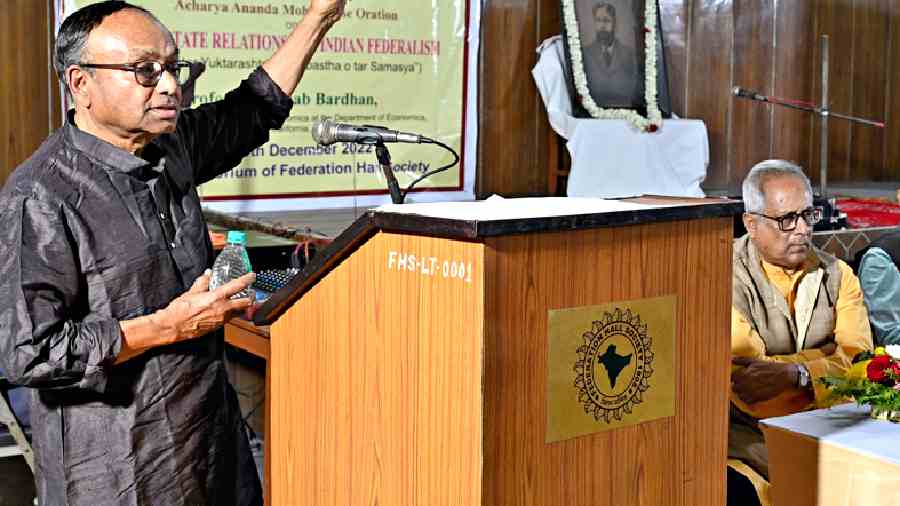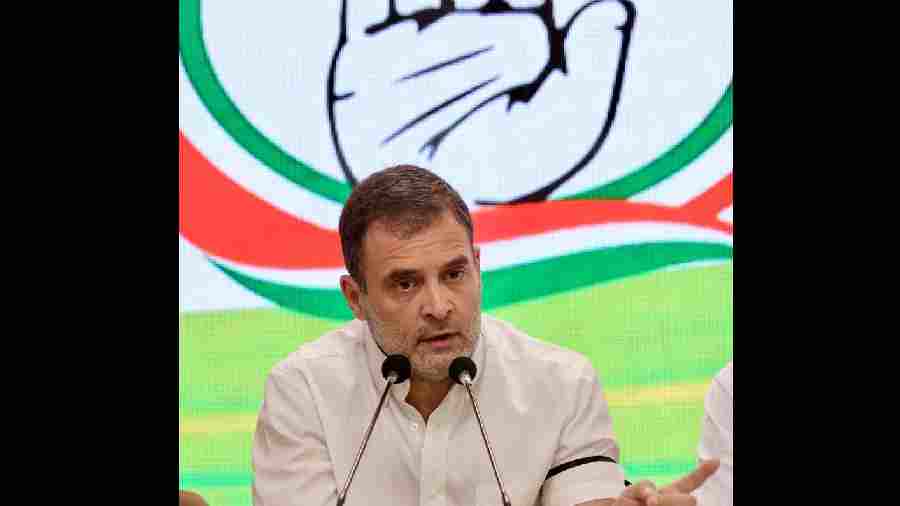Economist Pranab Bardhan said on Saturday that India was “heading towards autocracy” and stressed the need for “resistance” from the state governments.
The emeritus professor of economics at the University of California, Berkeley, cited several recent developments, such as the changes in Jammu and Kashmir, to express concern at the trend of concentrating power in the Centre’s hands.
“The Prime Minister and his associates talk about cooperative federalism, but it’s a fraud,” he said.
Bardhan’s observations came at a lecture, “Centre-State Relations and Indian Federalism”, organised by the Federation Hall Society, a heritage institution tracing its roots to the resistance against the 1905 Partition of Bengal.
“Our country is heading towards autocracy,” Bardhan said, flagging how power had been concentrated in the Prime Minister’s Office over the past eight years.
“When, in August 2019, a state (Jammu and Kashmir) was split, no views were sought from the people.... Since then, the new entities (Union Territories) are being ruled by the Centre. Something like this cannot be imagined in any country.”
For instance, he said, the state of California, where he lives now, cannot suddenly be split into “north” and “south” California by the US government.
Bardhan expressed surprise at the other states’ apparent silence after the central government’s Jammu and Kashmir experiment, which he said had signalled that similar steps might be taken in other parts of the country.
He cited the example of Bengal, where BJP legislators are demanding a separate North Bengal state.
In his opening remarks, Bardhan provided a historical perspective of the Centre-state conflict in the country. Such discord was expected in the Indian structure — often referred to as a “holding together federalism” — he said.
This was because the Constitution had conferred more powers on the Centre compared with most other federal structures, amid fears that the fledgling Union of States might collapse.
This concentration of power had allowed the Centre to change the constitutional structure of Jammu and Kashmir without any debate, Bardhan said.
The announcement of a nationwide lockdown on a four-hour notice on March 24, 2020 — although the impact of the pandemic differed across India — too was a result of the concentration of emergency powers with the Centre, he argued.
Bardhan referred to several other politically sensitive matters, such as infringements of the states’ rights over law-and-order issues through the use of central agencies, and the states’ growing dependence on the Centre for funds following the introduction of the goods and services tax (GST).
Echoing Opposition leaders such as Mamata Banerjee and Rahul Gandhi, Bardhan questioned the rationale of the Enforcement Directorate, CBI or the National Investigation Agency going to the states and arresting people despite law and order being a state subject.
“The BSF’s jurisdiction has been extended up to 50km from the international border…. We all know about the abuse of the AFSPA and because of this protection, people accused of murder and rape got away,” Bardhan said.
The Armed Forces Special Powers Act, in force in parts of the Northeast, gives the security forces extraordinary powers to search, arrest and shoot.
Bardhan said the new trend of handpicking people perceived to be close to the ruling party at the Centre as state governors — many of whom get involved in regular spats with the elected state governments as in Bengal and Kerala recently — too is causing a strain in Centre-state relations.
“This centralisation of power at the Prime Minister’s Office is not only impacting the non-BJP-ruled states, it is also going against the interests of BJP-ruled states,” he said.
He regretted that even state-level welfare schemes — even in BJP-ruled states like Madhya Pradesh — had been usurped by the Prime Minister.
“Even subsidies for LPG cylinders come with the picture of the Prime Minister…. Rights of people have now become gifts from the Prime Minister,” he added.
Bardhan, who has a special interest in state finances, dwelt at length on the impact that the centralisation of power has had on the financial relations between the Centre and the states.
“A study shows that the states collectively make 60 per cent of the total expenditure incurred by the governments while they get only 40 per cent of the resources generated in the country,” the economist said.
He gave a detailed account of how the states were being financially deprived, citing their inability to collect income tax — he said he paid income tax to both the US federal government and the California government — and the amendments to the terms of reference of the Finance Commission that define Centre-state financial relations.
“Earlier, discussions in the Planning Commission used to result in grants for the states, but they disbanded it and the power of giving grants went to the finance ministry,” Bardhan said.
“Then, the Centre is generating a lot of resources through cess and surcharge, which doesn’t go to the divisible pool (of revenues between the Centre and the states) and that’s why the states are not getting their share.”
He highlighted the delay in the disbursal of dues to the states from GST proceeds.
Bardhan stressed the need for resistance to the sweeping changes being brought about by the Narendra Modi government, and said this could be created in the states where the BJP juggernaut had often faced stiff challenges.
“The media is in a state of disaster, the universities (traditional points of protest) are not in good shape. Investigating agencies like the CBI are subservient to the Centre and the same goes for the Election Commission. At times, the justice delivery system too seems to be under the control of the Centre…. I am hopeful of resistance only from the states,” he said.
“But the states cannot create a proper resistance with begging bowl in hand,” he added, stressing the need for better fiscal management at the state level.
Bardhan also spoke of the concentration of power at the state level as well as of the rampant corruption.
He mentioned the states’ failure to come together and form a platform — a corollary of the near absence of unity among the Opposition parties.


